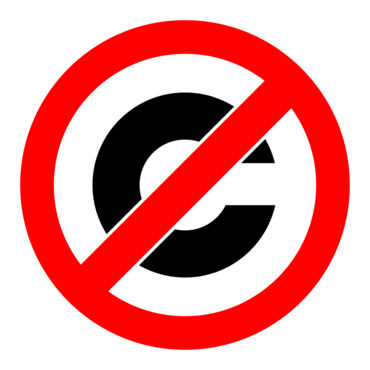Copywrong
 Just a couple of weeks ago it looked like the EU's proposed reform of the Copyright Directive, last updated in 2001, was going to run out of time. In the last three days, it's revived, and it's heading straight for us. As Joe McNamee, the outgoing director of European Digital Rights (EDRi), said last year, the EU seems bent on regulating Facebook and Google by creating an Internet in which *only* Facebook and Google can operate.
Just a couple of weeks ago it looked like the EU's proposed reform of the Copyright Directive, last updated in 2001, was going to run out of time. In the last three days, it's revived, and it's heading straight for us. As Joe McNamee, the outgoing director of European Digital Rights (EDRi), said last year, the EU seems bent on regulating Facebook and Google by creating an Internet in which *only* Facebook and Google can operate.
We'll start with copyright. As previously noted, the EU's proposed reforms include two particularly contentious clauses: Article 11, the "link tax", which would require anyone using more than one or two words to link to a news article elsewhere to get a license, and Article 13, the "upload filter", which requires any site older than three years *or* earning more than €10,000,000 a year in revenue to ensure that no user posts anything that violates copyright, and sites that allow user-generated content must make "best efforts" to buy licenses for anything they might post. So even a tiny site - like net.wars, which is 13 years old - that hosted comments would logically be required to license all copyrighted content in the known universe, just in case. In reviewing the situation at TechDirt, Mike Masnick writes, "If this becomes law, I'm not sure Techdirt can continue publishing in the EU." Article 13, he continues, makes hosting comments impossible, and Article 11 makes their own posts untenable. What's left?
 To these known evils, the German Pirate Party MEP Julia Reda finds that the final text adds two more: limitations on text and data mining that allow rights holders to opt out under most circumstances, and - wouldn't you know it? - the removal of provisions that would have granted authors the right to proportionate remuneration (that is, royalties) instead of continuing to allow all-rights buy-out contracts. Many younger writers, particularly in journalism, now have no idea that as recently as 1990 limited contracts were the norm; the ability to resell and exploit their own past work was one reason the writers of the mid-20th century made much better livings than their counterparts do now. Communia, an association of digital rights organizations, writes that at least this final text can't get any *worse*.
To these known evils, the German Pirate Party MEP Julia Reda finds that the final text adds two more: limitations on text and data mining that allow rights holders to opt out under most circumstances, and - wouldn't you know it? - the removal of provisions that would have granted authors the right to proportionate remuneration (that is, royalties) instead of continuing to allow all-rights buy-out contracts. Many younger writers, particularly in journalism, now have no idea that as recently as 1990 limited contracts were the norm; the ability to resell and exploit their own past work was one reason the writers of the mid-20th century made much better livings than their counterparts do now. Communia, an association of digital rights organizations, writes that at least this final text can't get any *worse*.
Well, I can hear Brexiteers cry, what do you care? We'll be out soon. No, we won't - at least, we won't be out from under the Copyright Directive. For one thing, the final plenary vote is expected in March or April - before the May European Parliament general election. The good side of this is that UK MEPs will have a vote, and can be lobbied to use that vote wisely; from all accounts the present agreed final text settled differences between France and Germany, against which the UK could provide some balance. The bad side is that the UK, which relies heavily on exports of intellectual property, has rarely shown any signs of favoring either Internet users or creators against the demands of rights holders. The ugly side is that presuming this thing is passed before the UK brexits - assuming that happens - it will be the law of the land until or unless the British Parliament can be persuaded to amend it. And the direction of travel in copyright law for the last 50 years has very much been toward "harmonization".
Plus, the UK never seems to be satisfied with the amount of material its various systems are blocking, as the Open Rights Group documented this week. If the blocks in place weren't enough, Rebecca Hill writes at the Register: under the just-passed Counter-Terrorism and Border Security Act, clicking on a link to information likely to be useful to a person committing or preparing an act of terrorism is committing an offense. It seems to me that could be almost anything - automotive listings on eBay, chemistry textbooks, a *dictionary*.
What's infuriating about the copyright situation in particular is that no one appears to be asking the question that really matters, which is: what is the problem we're trying to solve? If the problem is how the news media will survive, this week's Cairncross Review, intended to study that exact problem, makes some suggestions. Like them or loathe them, they involve oversight and funding; none involve changing copyright law or closing down the Internet.
Similarly, if the problem is market dominance, try anti-competition law. If the problem is the increasing difficulty of making a living as an author or creator, improve their rights under contract law - the very provisions that Reda notes have been removed. And, finally, if the problem is the future of democracy in a world where two companies are responsible for poisoning politics, then delving into campaign finances, voter rights, and systemic social inequality pays dividends. None of the many problems we have with Facebook and Google are actually issues that tightening copyright law solves - nor is their role in spreading anti-science, such as this, just in from Twitter, anti-vaccination ads targeted at pregnant women.
All of those are problems we really do need to work on. Instead, the only problem copyright reform appears to be trying to solve is, "How can we make rights holders happier?" That may be *a* problem, but it's not nearly so much worth solving.
Illustrations: Anti-copyright symbol (via Wikimedia); Julia Reda MEP in 2016.
Wendy M. Grossman is the 2013 winner of the Enigma Award. Her Web site has an extensive archive of her books, articles, and music, and an archive of earlier columns in this series. Stories about the border wars between cyberspace and real life are posted occasionally during the week at the net.wars Pinboard - or follow on Twitter.